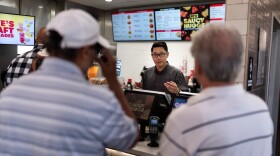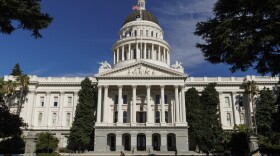STEVE INSKEEP, HOST:
It's MORNING EDITION from NPR News. I'm Steve Inskeep.
RENEE MONTAGNE, HOST:
And I'm Renee Montagne.
Ever since the American raid that killed Osama bin Laden, a fresh layer of tension has crept into relations between the U.S. and Pakistan. The Navy Seals who landed undetected in Abbottabad left Pakistanis wondering if they might land somewhere else next. Some Pakistanis ask if the U.S. might seize Pakistan's nuclear weapons.
INSKEEP: If that sounds paranoid, bear in mind that Americans actually do worry about those same weapons. Jeffrey Goldberg co-authored a report on Pakistan's weapons for The Atlantic and the National Journal.
JEFFREY GOLDBERG: From the American position, we don't want any other countries having nuclear weapons. But if some countries have nuclear weapons, we'd like to know that they are secure nuclear weapons. Now, if you could pick any country in the world to store 100 nuclear weapons, Pakistan would be your last choice. It is the global center of terrorism.
So if you're an American official who is in charge of worrying about nonproliferation, you're thinking to yourself: I better know where these Pakistani nuclear weapons are in case I have to go and get them.
INSKEEP: Now, that's an interesting point, because you've said that U.S. officials are concerned about jihadists of some kind grabbing a nuclear weapon.
GOLDBERG: Right.
INSKEEP: Is that what Pakistani officials are concerned about?
GOLDBERG: Pakistani officials - and let me be clear here - the Pakistani officials who are in charge of securing the nuclear program are generally well thought of. But they are as concerned about an American attack on the Pakistani nuclear apparatus than they are about jihadists. And this is a worry that was aggravated by the Abbottabad raid.
INSKEEP: Because U.S. troops got into Pakistan undetected and took something away.
GOLDBERG: And out. Right. And out. That really scared these Pakistani generals. It is not a completely credible fear. The Abbottabad raid, as difficult as it was to execute, was about a single target. You have nuclear weapons in Pakistan in maybe a dozen or 15 different places, and a lot of them are on the move.
They are moving them for fairly obviously reasons. Nuclear weapons need to be refurbished. They need to go to different plants for refurbishment. But they're also moving them to keep them hidden from jihadists, keep them hidden from India, and keep them hidden from the country that provides them with much of their defense budget - the United States of America.
INSKEEP: You report Pakistan moving its weapons around. You actually use the phrase delivery trucks. And when you talk about bombs being moved around in delivery trucks, I almost imagine like a FedEx shipment from one place to another. Is that kind of what's happening here?
GOLDBERG: Well, FedEx would probably be good. I mean, maybe if FedEx were doing it, I'd worry less.
There are a number of ways, obviously, you can move a nuclear weapon to hide it from people. One is you have a big armored convoy with protection all over the place and you move it down the road and everybody sort of knows that there's something in there, but it's very hard to get to. The Pakistani method generally is to do it through a kind of camouflage. So literally they are using vans.
INSKEEP: Low profile.
GOLDBERG: Low profile.
INSKEEP: Pick up a couple of hitchhikers along the way.
GOLDBERG: You've been on the roads in Pakistan more than I have. You know that these roads are not the Autobahn.
INSKEEP: It varies.
GOLDBERG: Yeah. It varies. And so these are the big worries, because you literally have a situation in which - let's just not even talk about nuclear weapons. Fissile material, the kind of material that could be stolen and turned into a dirty bomb, you have these being moved around in basically fairly insecure ways.
INSKEEP: Now, it's very clear that this is a source of great, I think we can call it paranoia, on the Pakistanis' part. And it's come to the point where you will read in the media and even hear from officials that terrorist attacks in Pakistan have been set up to destabilize the country so the U.S. has an excuse to steal the arsenal. But with that said, is the U.S. actually ready to go grab some nuclear weapons should the occasion arise?
GOLDBERG: The U.S. military, when it applies itself to a problem, can handle almost any problem. But what you're talking about here is not an Abbottabad -style raid or a series of raids. If you really wanted to neutralize the Pakistani nuclear arsenal, you'd be talking about an invasion of Pakistan.
And, again, the Pakistanis aren't completely paranoid. Let's just be clear here. They're not paranoid. In a perfect world, from the American foreign policy perspective, Pakistan wouldn't have nukes. If there were a cost-free way of denuclearizing Pakistan, I think any American president would be tempted to do so.
There is no cost-free way, so the American position, and the Pakistanis don't believe this, is we'd rather have them be safe in your hands and don't be paranoid about us.
But telling a Pakistani official not to be paranoid about American intentions, it's not going to work, as you know. So we have a situation where American planners, and this is not only a Special Forces issue, American planners have serious plans on the shelf that will be taken off the shelf if they feel that Pakistan is in danger of losing control of its nuclear weapons. And then you can imagine the chaos that would ensue.
INSKEEP: Jeffrey Goldberg is co-author of a story called "The Ally From Hell" in The Atlantic and the National Journal.
Thanks very much.
GOLDBERG: Thank you.
INSKEEP: And you'll find a link to that story at NPR.org. Transcript provided by NPR, Copyright NPR.





